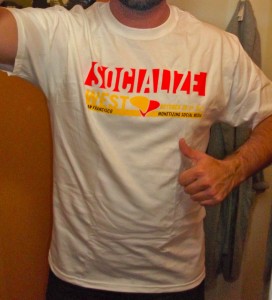Attack of the Buzzwords: Headache-inducing jargon I actually heard at a social-media conference

On Friday, I attended Socialize: Monetizing Social Media, a program at the University of Cailfornia San Francisco’s Mission Bay Conference Center presented by the websites Mediabistro, SocialTimes and All Facebook. As a subscriber to Mediabistro’s email newsletter, I received an offer to attend one day of the two-day conference for free, and I responded with a hearty, “Why not?”
Things started out nice enough, with a very down-to-earth keynote lecture by Geno Church of Brains on Fire, a South Carolina firm that helps businesses and nonprofits develop an organizational identity. The thrust of Church’s presentation was that good word-of-mouth still trumps any Twitter campaign when it comes to building buzz, and a great story is still the best way to encourage it. As an example, he spoke about how his company helped Love146, a charity devoted to stamping out child sex trafficking, settle on its name. At first, Love 146 struck me as potentially worse than blink-182, as far as names go—until I learned the story behind it.
After an undercover visit to a brothel where children were referred to only by number, Love 146’s founder had the image of a young girl with that number pinned to her shirt seared in his memory. Now every time somebody asks him about his organization’s name, it automatically leads to a story that dramatically emphasizes the importance of the work it is doing. That’s the kind of thing that spreads by word-of-mouth (which, you may have noticed, I’m doing right now).
After that, I attended a few more panels and presentations. They gave me some general insights into the current media landscape, but not nearly as much concrete advice as I’d been hoping for.
By 3 p.m., I was starting to get overwhelmed by the thick gumbo of jargon getting thrown around. Every other phrase out of the panelists’ mouths made my head hurt with the shear meaninglessness of it. They trumpeted the potential of “Web 3.0,” which is apparently an actual thing that people in marketing talk about. Eventually I just had to tune them out, but not before making some notes about some of the more egregious “ugh” moments:
- “Managing influencer communities.”
- “Leveraging what’s happening.”
- “These all have great brain equity.”
- “Branded storytelling for emerging media.”
- “Your mobile existence.”
- “What are you doing to measure intent around content interaction on social?”
- Repeated use of the word “conversions” to mean “people spending money on your website.”
Maybe I was going about it all wrong, actually attempting to pay attention to what the speakers were saying. As I looked around the room at each session, more than half the people were checking their email on their laptop or playing Words With Friends on a tablet. I’ll know next time.
Some part of me feels pride that being inundated with buzzwords is no longer the exclusive purview of engineers.
Other parts of me are appalled that the buzzword contagion has spread beyond engineering — can excessive reliance on acronyms be far behind?